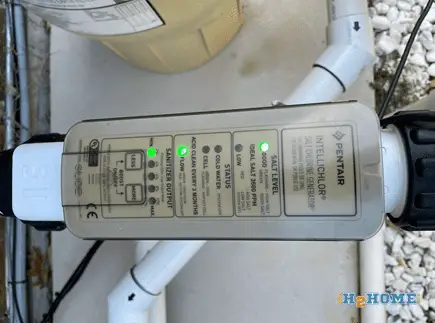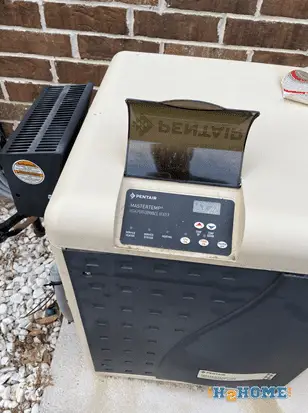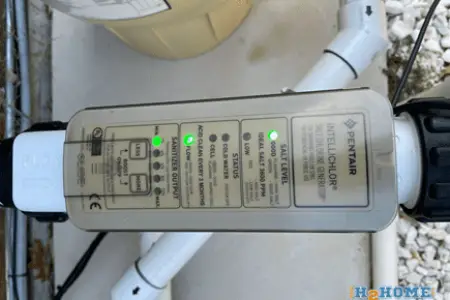You can absolutely heat a saltwater pool. In this article, I will cover the basics of saltwater pools, the various types of heaters, and special considerations for heating a saltwater pool.
What is the difference between a saltwater vs. a traditional chlorine pool?
The chlorine part is not much different between a traditional chlorine pool and a saltwater pool. The chlorine in both pool types sanitizes and oxidizes your pool water keeping it safe to swim.
Saltwater pools use a piece of equipment to break up the salt molecules so that the chlorine can be used to sanitize your pool. If you remember back to your days in chemistry class, you will remember that sale is NaCl or Sodium + Chlorine.
Your equipment will specify your target salt level, generally around 3,000 ppm. At those levels, most people cannot taste the salt in the pool water. Even at a high salt level of 4,000 ppm, you are still just a fraction of the salinity of ocean water
Salt like this is added to the pool to bring up the salinity.
- Formulated with non-hazardous ingredients that are safer to handle and are...
- This Premium, 99.8% soluble clean & pure pool salt is made from extra fine,...
- Package Weight: 41.0 pounds
- Package Dimensions: 20.0 L x 4.0 H x 14.0 W (inches)
Saltwater Pool Myths
There are a lot of myths associated with saltwater pools.
The first one is related to the corrosiveness of saltwater. Saltwater can indeed be corrosive, but it is not the rock-eating and equipment destroying water that can be portrayed.
The salt in your pool is much more in line with the salinity of your tears and that of fresh tap water than it is to the ocean.
Even then, think about the last time you were at the ocean, which is ten times the salinity of your backyard pool. The ocean has rocks in it that miraculously have not been dissolved by saltwater and waves and can be hundreds or thousands of years old. Saltwater at a fraction of that salinity and at a fraction of that time will not cause significant corrosion of quality pool materials and equipment.
The next is that you have to constantly add salt, so what is the difference between adding salt vs adding chlorine. In a pool, the salt in the water is turned into chlorine by the Saltwater Chlorine Generator (SWCG). After the chlorine does its job in sanitizing your pool, it turns back into salt to repeat the process over and over and does not need to be replenished.
The only time the salt actually leaves your pool is when water leaves your pool. This can occur through splashing water out of the pool, a leaky pipe, or backwashing your pool. That means you might have to add salt occasionally, but this is usually limited to once a season.
Also note that water can leave your pool through evaporation, but in the evaporation process the salt remains in your pool.
This list of saltwater pool myths can be quite lengthy so do your own research and always be sure to take those myths with a grain of salt.
What are the Components of a Saltwater Pool?
Similar to a chlorine pool, the components of a saltwater pool each have a job to do as the water circulates through the system.
Let us begin with the water that is in your pool. It will remain in your pool until it is sucked into the skimmer or drain, which is called the suction side of your pool.
As this water enters into the pump, which is responsible for circulating the water in your pool. Pumps for saltwater pools are no different than chlorine pools and most manufacturers have pumps that are rated for both salt and non-salt pools.
Next, the water enters into the pressure side of the system where it is pushed through the various components beginning with your filter. Filters for saltwater pools are no different than non-salt pools and can use sand, cartridges, or diatomaceous earth to filter tiny particles out of your pool.
This newly filtered water next passes to your heater. Please note that if you are adding a heater to a saltwater pool, you need to make sure that you have enough room on your equipment pad. Otherwise, you may need to expand your equipment pad and re-plumb your equipment which can sometimes cost as much as the equipment itself.
After passing through your heater, the next stop for the water is the Saltwater Chlorine Generator (SWCG). A SWCG is where the magic happens in a saltwater pool. Through the process of electrolysis, the salt molecules are split to generate the chlorine for sanitizing your pool.

Finally, this filtered, heated, and now chlorinated water is ready to return to your pool. Typically this is returned to your pool via pool returns or jets in the walls of your pool. Other methods of returning water to your pool are through water features or pressure-side cleaners.
After the water and chlorine enters your pool, the chlorine will do its job on organics in the water and eventually turn back into salt and be ready to repeat the process. This turnover cycle occurs multiple times a day depending on your pump setup.
Types of Heaters
The primary types of pool heaters are:
- Gas Heaters powered by either natural gas or propane
- Heat pumps generally powered by electricity
- Solar heaters that warm your pool water using the power of the sun
For a more in-depth look at the various types of heaters, see my article on Pool Heaters here.
Natural Gas/Propane Heaters
The most common type of heaters are gas heaters. These work by passing water through a heat exchanger placed under a burner using either natural gas or propane. Your choices for these are limited to your fuel type, typically either a natural gas line to your house or a propane tank on your property. Gas heaters are the quickest heaters, but typically the most expensive to operate and have the shortest lifespan.

Gas heaters: Special Considerations for Saltwater Pools
The heating element material of your gas heater can dictate the longevity of your pool heater, especially in a saltwater pool.
The most common heating element material is copper. Copper can be fine for saltwater pools, but I would recommend going with a material more resistant to corrosion to ensure you get the most life out of your heater. If you choose to go with a copper heating element, make sure that you properly maintain your water chemistry especially the pH as a low pH can wreak havoc on your heating element.
The next step up from copper would be Cupronickel. These still contain copper but it is an alloy also containing nickel and much more resistant to corrosion.
- BEST FOR: In-ground pools and spas with a surface area up to 600 ft. where...
- PREMIUM PERFORMANCE: The Hayward Universal H-Series 200,000 BTU Natural Gas...
- CORROSION PROTECTION: The Universal H-Series boasts exceptional protection...
- ENERGY SAVINGS: The efficient, industry-leading design reduces circulation...
- EASY-TO-USE: Intuitive front control panel provides easy operation, service...
The most corrosion-resistant heating element is titanium, which is also the most expensive heating element material.
Electric Heat Pumps
Overview
Heat pumps are powered by electricity and work by transferring the heat in your air and putting it into your pool water as it passes through the heat pump.
Heat pumps are excellent at efficiently maintaining your water temperature, but may not be the best choice for a quick heating of a pool or spa.
Heat pumps may be a good option if you live in a warm or moderate climate and want the ability to swim year-round, or they can be used in colder climates during the swim season extend the season by a few weeks or even months.
Heat Pumps: Special Considerations for saltwater pools
Just like gas heaters, the internal material should be able to handle saltwater. Unlike gas heaters, the majority of heat pumps utilize a titanium heat exchanger for longevity and corrosion-resistant properties.
These titanium heat pumps can last longer than gas-powered heaters, but generally cost more than gas heaters.
- Raypak Classic Series Model R8450TI-E Heat Pump
- Long-lasting and durable outer steel case
- Super-quiet swept wing fan
- Titanium tube heat exchanger
- Heat Output - 140,000 BTU
Solar Heaters
Solar heaters utilize the power of the sun to heat your pool water. Your pool water is pumped through a series of valves into solar panels mounted on your roof or other location near your pool equipment. These solar panels heat your pool water and it is pumped back into your pool.
One of the many solar heater kits available for your pool:
No products found.
Solar Heaters: Special Considerations for saltwater pools
Unlike gas heaters and heat pumps, there are no heating elements for solar heaters and little to no metal that comes into contact with the water.
Being that the majority of the material of the solar heater is plastic, there are generally no variations on solar heaters for chlorine pools or solar heaters for saltwater pools. As a best practice, I always recommend checking with the manufacturer for compatibility with saltwater pools before you finalize your purchase.
FAQ – Heating a saltwater pool
Will the saltwater destroy my heater?
Answer: No. Make sure your heater is rated for saltwater, typically with a titanium or cupronickel heating element.
Will heating the pool in the winter allow me to use my Saltwater Chlorine Generator?
Answer: Yes. Most SWCGs shut down at colder temperatures, requiring you to occasionally add chlorine. Heating the pool will allow the SWCG to turn on when it is above its minimum operating temperature.
What is the deal with sacrificial anodes?
Answer: A sacrificial anode is a piece of metal, usually zinc, that is added to the pool equipment to sacrifice itself to corrosion and protect the other metals in your pool. I’m not 100% convinced you need a sacrificial anode in a salt pool, but it can be an inexpensive addition to your pool equipment that potentially protects much more expensive equipment.
How can I make my heater last longer?
Answer: Proper water chemistry is key to maintaining your heater, especially low pH. I recommend keeping your pH between 7.2 and 7.8, with many heaters being sensitive to pH below 7.2.
What type of salt do I use in my pool?
Answer: Generally salt is salt. Pool stores and some hardware stores sell fine-grained pool salt that is fast dissolving, but larger water softener salt pellets will work just fine. The key is to look at the ingredients and make sure there are no additives and that it is pure salt.
How do I add salt to my pool?
Answer: I recommend adding the salt to the deep end of your pool, then using your brush or pool cleaner to stir around the salt until it dissolves. Also during this time, you should turn off your SWCG by putting it at 0% to prevent damage to the unit.
Will a saltwater pool feel like swimming in the ocean?
Answer: No, seawater is 10x more saline than a saltwater pool kept at 3,000 ppm. t that level, some people may be able to taste the salt, but others cannot. I cannot taste it until about 3,200 ppm and even then it is a very slight hint of salt.
Can I use my gas heater all winter?
Answer: Technically yes, but using a gas heater continually all winter is not recommended. A heat pump is much more efficient at maintaining pool water temperatures throughout the entire winter. Save gas heaters for when you want to quickly heat the attached spa, or occasionally heating the pool during the winter.
Conclusion
I hope that this guide alleviates any concerns with heating your saltwater pool and choosing the correct heater.
Remember to always check the manufacturer’s specifications to ensure they are compatible with salt systems. For gas heaters and heat pumps, a cupronickel or a titanium heating element is recommended over copper.

I am passionate about taking care of pools and started over 20 years ago as a young entrepreneur taking care of several neighbor’s pools in the Houston, TX area. Now I live in Prosper, TX, and am known as the Prosper Pool Consultant:
I specialize in solving short-term pool issues with the goal of educating that customer so that they never need my services in the future. It is a unique business model, but I find it very rewarding to see pool owners gain the confidence and tools to manage their pools themselves.



